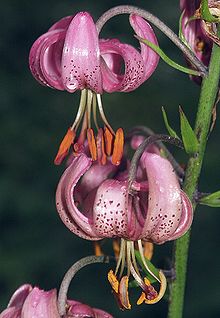Liliales
Liliales is an order o monocotyledonous flouerin plants. This order o necessity includes the faimily Liliaceae, but baith the faimily an the order hae haed a widely disputit history, wi the circumscription varyin greatly frae ane taxonomist tae another. Weel kent plants frae the order include Lilium (lily), tulip, the North American wildflouer Trillium, an greenbrier.
| Liliales | |
|---|---|

| |
| Lilium martagon (Martagon lily) | |
| Scientific classification | |
| Kinrick: | Plantae |
| Clade: | Angiosperms |
| Clade: | Monocots |
| Order: | Liliales Perleb (1826)[1] |
| Teep species | |
| Lilium candidum L. | |
| Faimilies | |
|
Alstroemeriaceae | |
The APG III seestem (2009) places this order in the clade monocots. In APG III, the faimily Luzuriagaceae is combined wi the faimily Alstroemeriaceae an the faimily Petermanniaceae is recognized. APG III uises this circumscription:
- order Liliales
- faimily Alstroemeriaceae
- faimily Campynemataceae
- faimily Colchicaceae
- faimily Corsiaceae
- faimily Liliaceae
- faimily Melanthiaceae
- faimily Petermanniaceae
- faimily Philesiaceae
- faimily Rhipogonaceae
- faimily Smilacaceae
Thus circumscribed, this order consists maistly o yerbaceous plants, but lianas an shrubs occur. They are maistly perennial plants, wi fuid storage organs such as corms or rhizomes. The faimily Corsiaceae is notable for bein heterotrophs.
The order haes warldwide distribution. The lairger faimilies (wi mair nor 100 species) are roughly confined tae the Northren Hemisphere, or are distributit warldwide, centerin on the north. On the ether haund, the smaller faimilies (wi up tae 10 species) are confined tae the Southren Hemisphere, or sometimes just tae Australie or Sooth Americae. The tot nummer o species in the order is nou aboot 1300.
As wi any yerbaceous group, the fossil record o the Liliales is rather scarce. There are several species frae the Eocene, such as Petermanniopsis anglesaensis or Smilax, but their identification is nae definite. Another kent fossil is Ripogonum scandens frae the Miocene. Due tae the scarcity o data, it seems impossible tae determine precisely the age an the initial distribution o the order. It is assumed that the Liliales originate frae the Lower Cretaceous, ower 100 million years ago. The initial diversification tae the faimilies teuk place atween 82 an 48 million years ago (Vinnersten an Bremer, 2001).
Aulder classifications eedit
The APG II seestem (2003) places this order in the clade monocots an uises this circumscription:
- order Liliales
- faimily Alstroemeriaceae
- faimily Campynemataceae
- faimily Colchicaceae
- faimily Corsiaceae
- faimily Liliaceae
- faimily Luzuriagaceae
- faimily Melanthiaceae
- faimily Philesiaceae
- faimily Rhipogonaceae
- faimily Smilacaceae
The APG seestem (1998) also placed the order in the clade monocots, but wi a slightly different circumscription (missin the faimily Corsiaceae):
- order Liliales
- faimily Alstroemeriaceae
- faimily Campynemataceae
- faimily Colchicaceae
- faimily Liliaceae
- faimily Luzuriagaceae
- faimily Melanthiaceae
- faimily Philesiaceae
- faimily Ripogonaceae [sic]
- faimily Smilacaceae
The Cronquist seestem (1981) placed the order in subclass Liliidae in the class Liliopsida [= monocotyledons] o diveesion Magnoliophyta [= angiosperms]. It uised a much wider circumscription (mony o the plants here are assigned tae Asparagales an Dioscoreales bi APG II):
- order Liliales
- faimily Agavaceae
- faimily Aloaceae
- faimily Cyanastraceae
- faimily Dioscoreaceae
- faimily Haemodoraceae
- faimily Hanguanaceae
- faimily Iridaceae
- faimily Liliaceae
- faimily Philydraceae
- faimily Pontederiaceae
- faimily Smilacaceae
- faimily Stemonaceae
- faimily Taccaceae
- faimily Velloziaceae
- faimily Xanthorrhoeaceae
The Thorne seestem (1992) placed the order in superorder Lilianae in subclass Liliidae [= monocotyledons ] o class Magnoliopsida [= dicotyledons] an uised this circumscription:
- order Liliales
- faimily Alstroemeriaceae
- faimily Campynemataceae
- faimily Colchicaceae
- faimily Iridaceae
- faimily Liliaceae
- faimily Melanthiaceae
- faimily Trilliaceae
The Dahlgren seestem placed the order in superorder Lilianae in subclass Liliidae [= monocotyledons] o class Magnoliopsida [= angiosperms] an uised this circumscription:
- order Liliales
- faimily Alstroemeriaceae
- faimily Calochortaceae
- faimily Colchicaceae
- faimily Iridaceae
- faimily Liliaceae
- faimily Uvulariaceae
In the Engler seestem (1964 update) a similar order wis named Liliiflorae, placed in the class Monocotyledoneae o the subdiveesion Angiospermae.
The Wettstein seestem, last revised in 1935, uised names similar tae those in the Engler seestem: the order wis named Liliiflorae placed in the class Monocotyledones o the subdivision Angiospermae. In circumscription the order wis fairly similar tae that o Cronquist.
Earlier names for this order include the Coronarieae o the Bentham & Hooker seestem.
References eedit
| Wikimedia Commons haes media relatit tae Liliales. |
- W. S. Judd, C. S. Campbell, E. A. Kellogg, P. F. Stevens, M. J. Donoghue (2002). Plant Systematics: A Phylogenetic Approach, 2nd edition. Sinauer Associates, Sunderland, Massachusetts.CS1 maint: multiple names: authors leet (link) ISBN 0-87893-403-0.
- K. J. Perleb (1826). Lehrbuch der Naturgeschichte des Pflanzenreichs, 129. Magner, Freiburg im Breisgau.
- P. J. Rudall, K. L. Stobart, W.-P. Hong, J. G. Conran, C. A. Furness, G. C. Kite, M. W. Chase (2000) Consider the Lilies: Systematics of Liliales. In: Wilson K, Morrison DA, (eds.). Monocots: Systematics and Evolution. CSIRO, Melbourne.CS1 maint: multiple names: authors leet (link) CS1 maint: extra text: authors leet (link) ISBN 0-643-06437-0.
- A. Vinnersten, K. Bremer (2001). "Age and biogeography of major clades in Liliales". American Journal of Botany. 88 (9): 1695–1703. doi:10.2307/3558415. JSTOR 3558415. PMID 21669704. (Available online: [1])